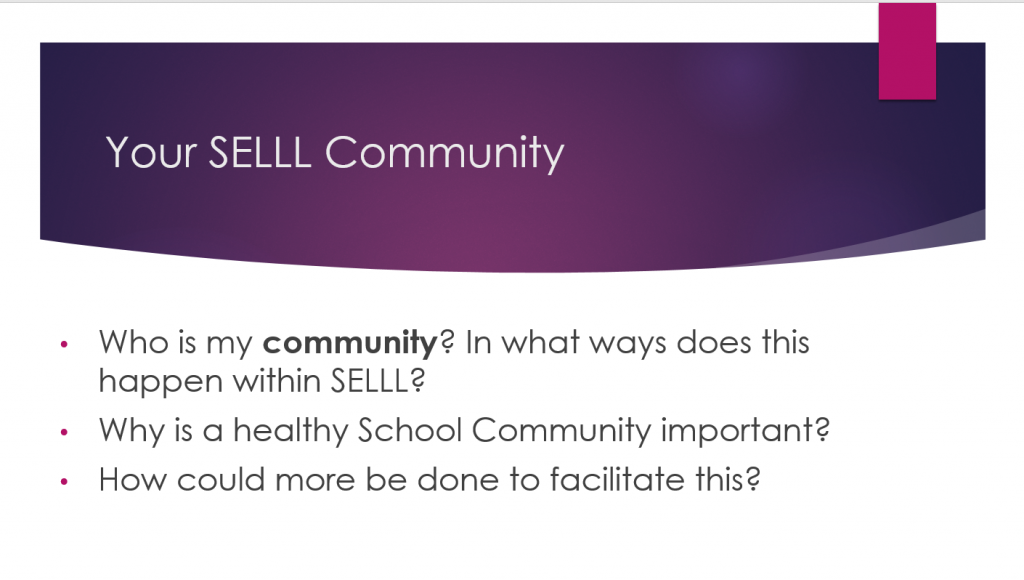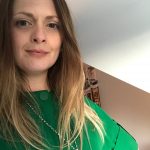Dr Jennifer Orr, Director of Excellence in Learning and Teaching (DELT)
School of English Literature, Language and Linguistics
Humanities and Social Sciences
What did you do?
We introduced 2 bespoke sessions per year group, bringing together the whole cohort to get them to reflect on their learning community and to see the degree as a holistic process.
Graduate Framework
This approach develops the following attributes:
- Future Focused
- Resilient
- Confident
- Collaborative
- Engaged
Staff can find out more about the Graduate Framework on the University intranet.
Who is involved?
All SELLL Undergraduate students
Student Voice reps
The Director of Learning and Teaching, Heads of Subjects, Degree Programme Directors, the Chair of Examiners and representatives from key University services such as Careers and Student Wellbeing.
How did you do it?
The DELT led most of these sessions, with support from the Head of School, Degree Programme Directors, Subject Heads, Student Voice reps and Careers Service staff.
We sat down, looked at our NSS feedback and identified what were the ‘big issues’ that we kept coming up against from year to year and what would be most useful for students to discuss with us.
This year, we were able to embed work being carried out through Faculty Education Working Groups on Respectful Feedback (which focused on student-staff communication including email etiquette, assessment and feedback and survey feedback). This allowed us to target some hardy perennial issues like attendance, exploring through activities and discussion why participation adds value to the student experience.
At Stage 2 specifically, we embedded specific ‘closing the loop’ activities such as an employability follow up session (run by the DELT and Jos Harrison, Careers Service) for Stage 2s following our SELLL Employability event in February.
At Stage 3, we were able to reassure students about how their degree is calculated, pointing to our flagship algorithm and External Examiner procedures.
This year the following sessions ran:
Semester 1:
Stage 1 – “Moving from A-Level to University”
Stage 2 – “Marking and Feedback”
Stage 3 – “The elusive first and how to get one’
Semester 2:
Stage 1 – “Your Degree Story: the role of Stage 1 in what comes next”
Stage 2 – “Getting the Most from your Learning Community” (featuring a session from Jos Harrison)
Stage 3 – “Calculating your Final Degree & Getting the Most out of your final Semester” (featuring a session on feedback and survey etiquette, ahead of the NSS)*

Example Slide from ‘Doing the Degree’ presentation.
Why did you do it?
The sessions were tailored to our strategic objectives in (i) developing the whole student and (ii) Education for Life.
We want to emphasise our School community in response to student feedback which indicated that they felt that they rarely had the opportunity to come together as a whole year group. It was also designed to address some ‘hardy perennial’ issues that come up year after year for both students and staff such as “What is my learning community?”, “Employability” and “Assessment and feedback”.
The sessions were designed to involve lots of key people at management level, the Student Voice and within key services so that students get a better sense of the excellent resources that are available to them and how they can get the most out of their learning community.
As stress levels among the students rise, this helps to ‘lift the veil’ on all of the various processes that we go through to help them achieve their best and, above all, that we value ‘the whole student’.
Does it work?
The feedback among the students on the day was very positive. One said that she felt it was the first time she had the opportunity to feed back her thoughts about the course in a ‘human’ form to a survey. It was great for students to have another opportunity to meet the PG course rep who had been through their experience as an UG and ‘came out the other side’!
Students were able to benefit from direct access to a Career Service experts who reminded them of the internship opportunities at the best possible time in their course. It has been a great way for us to build on our excellent relationships with colleagues in University services such as Careers and Student Wellbeing.
In a modular course, events like these also allow us to give students a roadmap of their course to see how things fit together. Above all, it fosters the sense of the University as a community, something which can sometimes be hard to achieve in a modular system.
We did struggle with attendance in Semester 2 which reflected a trend across the cohort as a whole. The challenges are to ensure an attractive timeslot (Getting over 250 students timetabled in one room is a tough ask and often leads to a 9am or a 4pm Friday slot!) and that the event is publicised well enough in advance.
We feel we have performed better on the ‘community’ aspect of evaluations and it has encouraged us to do more events in the future which get our cohort together as a group with their peers.
Contact details
Dr Jennifer Orr, School of English Literature, Language and Linguistics.

